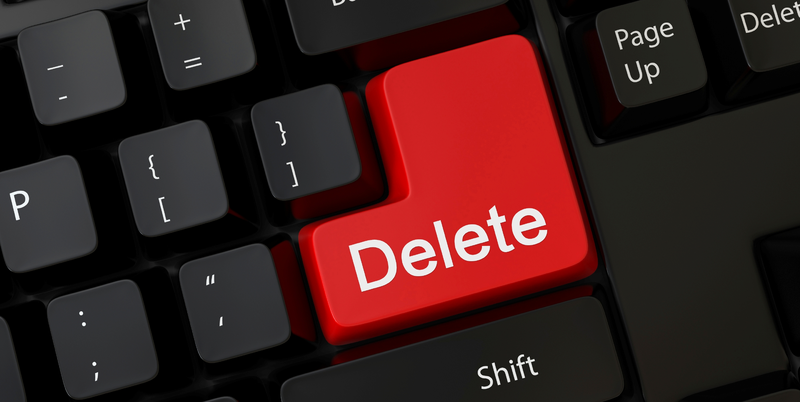With so much data flowing around the world, one of the things that really should be taken into account is when to get rid of things. It may seem silly thinking of getting rid of data, certainly when we can purchase more cloud space if we run out. Here’s my issue, just because you CAN keep all the information you could possibly make, don’t necessarily mean that you should. The problem comes from what I’m going to call “information bloat” or having too many documents in your filing system. There are two parts to the delete process. There is the initial moving of the files from wherever they were in your filing system into your recycle bin, and then there is the actual removal of the data permanently from your computer. When you hit “delete” it doesn’t delete them, it just moves them to the recycle bin. What is essential is removing them from the recycle bin, which permanently deletes them from your system.
1) Frees up needed space – This may surprise you, but when you hit delete on a file, and it goes to the recycle bin, it’s still on your computer. With the data always on your computer, it takes up the RAM (Random Access Memory) that is used to run the apps on your computer, and save anything that you happen to save to your computer. After a while, this can cause problems. A few years ago, I was having issues with my laptop. Everything was running slow, and I was unable to save documents to my hard drive. I should mention that this was before cloud technology, so I didn’t have that option. I went into my Recycle bin and found that there were thousands of files waiting to be permanently deleted. I did a complete purge of my Recycle bin and found that I had 10 GB of RAM that I was able to use. If you save everything you use and don’t empty your recycle bin, you will find that your system will not work correctly.
2) Gets rid of stuff you don’t need – My philosophy is that if I’ve sent it to the Recycle Bin, I don’t need it. To be clear, I don’t delete things immediately after they go into the recycle bin. I generally go through and remove the items in my recycle bin around once a quarter. I figure that if I wait for a while (about 3 months), then enough time will have passed, and if I needed a specific file that I’d previously deleted, I would have gone and retrieved it from the recycle bin. Keeping things in your recycle bin for a SHORT (I emphasize short) period of time makes it so that if you accidentally deleted something, then it’s not lost forever. If something happens where you need a document you previously deleted, you can retrieve it.
3) Speeds up your computer – With less stuff rattling around on your hard drive, you will be able to do more. Because the RAM on your computer is limited when you keep things in your recycle bin and let it pile up, that will slow down your computer. With a combination of cloud technology and good organization, there should be no reason to keep any files on your machine, so what’s the point in maintaining records you felt you could delete in your recycle bin?
Permanent deletion of data is a bit….permanent, but it is necessary. You will not need to keep everything you produce or download, so making sure that your Recycle Bin is a key part in making sure that your computer is running at its optimal efficiency. The whole point of using computers is making our lives easier and more efficient, so doing everything to keep them efficient is something that we all need to be able to do. When you hang on to things that you don’t need, it slows your system down and does nothing to help you out, which is why you need to make sure that you keep an eye on what you’ve deleted and remove it entirely from your system every once and a while.
How much do you have in your Recycle Bin?
Let me know in the comments section below. If you like this blog post and want to see more, you can follow me on Social Media (LinkedIn, Instagram, and Facebook @jasonlovefiles) or Subscribe to my blog to get new content delivered directly to your mailbox.

